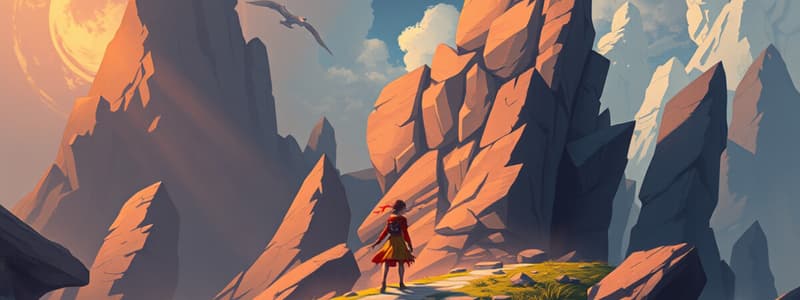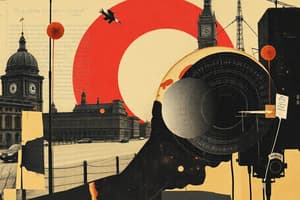Podcast
Questions and Answers
What is media literacy primarily concerned with?
What is media literacy primarily concerned with?
- Only reading information
- Understanding digital technology
- Reading, analyzing, evaluating, and producing communication (correct)
- Exchanging messages in groups
Information literacy focuses solely on the production of information.
Information literacy focuses solely on the production of information.
False (B)
What does interpersonal communication involve?
What does interpersonal communication involve?
Two to three individuals interacting through their voice and bodies.
The world's first newspaper, the __________, was published in Rome around 130 BC.
The world's first newspaper, the __________, was published in Rome around 130 BC.
Match the following types of communication with their definitions:
Match the following types of communication with their definitions:
Which of the following is an example of mediated interpersonal communication?
Which of the following is an example of mediated interpersonal communication?
The term 'communication' originates from the Latin word 'communis', which means common.
The term 'communication' originates from the Latin word 'communis', which means common.
What materials were used in the creation of early written documents in ancient Egypt?
What materials were used in the creation of early written documents in ancient Egypt?
Which printing technique originated in China and was widely used throughout East Asia for textiles and later paper?
Which printing technique originated in China and was widely used throughout East Asia for textiles and later paper?
The first electrical telecommunication system was the telegraph.
The first electrical telecommunication system was the telegraph.
Who invented the typewriter and in what year was it first used?
Who invented the typewriter and in what year was it first used?
The ___________ was a significant development in the Electronic Age and utilized the 'power of electricity'.
The ___________ was a significant development in the Electronic Age and utilized the 'power of electricity'.
Match the invention with its associated year:
Match the invention with its associated year:
During which era did people first utilize the worldwide web for communication?
During which era did people first utilize the worldwide web for communication?
The motion picture with sound was developed before commercial motion pictures.
The motion picture with sound was developed before commercial motion pictures.
What was the primary material used for making the paper in the Mayan region?
What was the primary material used for making the paper in the Mayan region?
Study Notes
Media Literacy
- Ability to read, analyze, evaluate, and produce communication across various media forms.
Information Literacy
- Ability to recognize information needs and locate, evaluate, use, and communicate information effectively in different formats.
Technology (Digital) Literacy
- Proficiency in using digital technology and networking tools to locate, evaluate, create, and use information.
Definition of Communication
- Involves the exchange of messages among individuals/groups through speaking, writing, gestures, or symbols.
- Derives from Latin "communis," meaning common.
- Key in daily life for information transmission to intended audiences.
Types of Communication
- Interpersonal Communication: Interaction between 2-3 individuals using voice and body language.
- Mediated Interpersonal Communication: Interaction that requires devices like pen, telephone, or computer.
- Organizational Communication: Communication in workplace settings.
- Public Communication: One person communicating to a large audience.
Categories of Communication
- Verbal Communication: Includes both oral and written forms.
- Non-Verbal Communication: Encompasses signs, symbols, gestures, body language, and facial expressions.
Evolution from Traditional to New Media
Pre-Industrial Age (before 1700s)
- Discovery of fire, development of paper, and use of stone tools for daily activities.
- Cave Paintings: Earliest form of traditional media around 35,000 BC.
- Clay Tablets in Mesopotamia: First writing form, dating back to 2400 BC.
- Papyrus in Ancient Egypt: Chief writing material around 2500 BC, later adopted by Greeks for correspondence and legal documents.
- Acta Diurna in Rome: The world's first newspaper published around 130 BC, serving as daily public records.
- Dibao in China: Imperial bulletins issued in the 2nd century.
- Codex in the Mayan Region: Folding books featuring hieroglyphics, from the 5th century.
- Printing Press using Wood Blocks: Developed in China around 220 AD, initially for textiles.
Industrial Age (1700s-1930s)
- Economic and societal transformations driven by machinery and long-distance communication, such as the telegraph.
- Printing Press for Mass Production: Developed by Johannes Gutenberg in 1436.
- London Gazette: Established in 1640 as a newspaper.
- Typewriter: Invented by Christopher Latham Sholes in 1867, commercially available by 1874.
- Telephone: Patented by Alexander Graham Bell in 1876.
- Motion Pictures: Developed by Thomas Edison and William Kennedy Laurie around 1890, evolving to include sound by 1926.
Electronic Age (1930s-1980s)
- Transition to using electricity for communication aided by technological advances.
- Transistor Radio: Emerged as a portable radio receiver using transistors.
- Television: First introduced for public use in 1941.
- EDSAC: First electronic computer completed in 1949.
- UNIVAC: The first commercially available computer by Mauchly and Eckert in 1951.
- Apple 1: Launched in 1976, marking a milestone in personal computing.
Information Age (1900s-2000s)
- Also known as the Digital Age, characterized by the rise of the internet.
- Enhanced communication speed and accessibility via social networks and media platforms.
- Rapid advancements in microelectronics drove innovation.
Studying That Suits You
Use AI to generate personalized quizzes and flashcards to suit your learning preferences.
Description
This quiz will test your knowledge on media literacy, information literacy, and digital literacy. You'll explore definitions and concepts related to analyzing, evaluating, and producing communication in various forms. Engage with the material to enhance your understanding of effective information usage.




